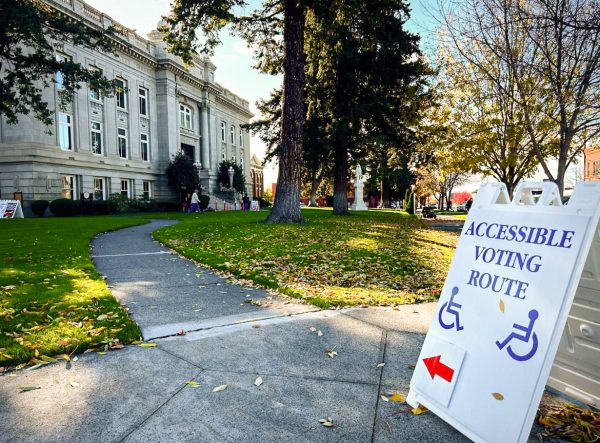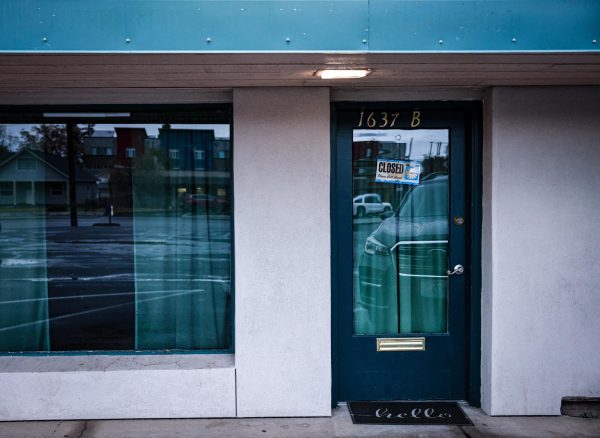Former President Donald Trump and the Republican Party defeated Vice President Kamala Harris and the Democratic Party during last Tuesday night’s presidential race. While many in the Democratic camp discussed the possibility of Project 2025 and utilized it as a talking point against a second Trump term, the discussion now turns to preventing many of the proposals in the document, which the ACLU has described as “a roadmap for how to replace the rule of law with ring-wing ideals,” from becoming law.
Jordan Barth, former hotline and research coordinator for the Democratic National Committee during the 2020 election cycle, offered advice for communities worried about Project 2025’s potential impacts.
“Get involved in your community. Not only are there likely neighbors and folks around you that need assistance, but also the greatest national changes have often risen up from local, regional and state ideas,” Barth said.

While Whitman’s student body tends to lean blue, the majority of Walla Walla voters elected Republican and conservative candidates. Notably, the Walla Walla GOP’s website encourages readers to watch Matt Walsh’s documentary “What Is A Woman?”, which promotes conspiracy theories about the Transgender community. In the wake of Trump’s election, Walsh tweeted “Now that the election is over I think we can finally say that yeah actually Project 2025 is the agenda. Lol.”
Experts say such connections between local Republicans and national figureheads who tout extremist views should not be overlooked.
“I think [Trump’s] reach is increasingly getting to the local level,” Barth said.
Barth also notes the importance of engaging with those you might disagree with.
“Give one another grace, be kind to one another. Just because you disagree with someone does not mean you need to be disagreeable. Kindness and empathy have unfortunately been lost in our politics,” Barth said.
For some Whitman students, these efforts are not new. Adrian Liborio Camacho, a Whitman student from Texas, pointed out his experience living in a generally red state.
“At least for me the impact back home would be much different than it is [at Whitman] because Texas is already red,” Liborio Camacho said.
Others worry about the impacts that Project 2025 may have within the Whitman community. Sofia Maldonado, a student from Minnesota, which remained blue this election cycle, pointed to Project 2025’s goals to overhaul the Department of Education (DOE).
“Based on the Project 2025 details and financial aid, I think it would impact a lot,” Maldonado said.
Barth pointed to Project 2025’s goals of altering the DOE’s funding as one source of concern for students and administrators.
“Project 2025’s transformation of the Department of Education will fundamentally transform the ways in which students and young adults interact with government when receiving their education,” Barth said. “A completely defunded (or defunded in part) and hollowed-out Department will make college campuses more dangerous, less affordable for those using college as a ticket to the middle or upper middle class and the very opposite of what college should be, a place for students to explore new ideas.”
According to PEN America, “Project 2025 actually proposes dismantling the Department of Education in its entirety, which would eliminate essential data on America’s public schools and related research – like student demographics and attainment or curricula effectiveness.”
During the first Trump administration, the Department of Education (DOE) was overseen by Secretary of Education Betsy DeVos, who ushered in new Title IX policies which (in part) allowed accused rapists to cross-examine their victims. The National Education Association described DeVos’ Title IX reforms as “[making] schools and campuses more dangerous for girls and women.”
Negative impacts from DeVos’ DOE policies were felt across the country, but Project 2025 wants to take it a step further. The DOE issues guidance on and enforces Title IX policy. Without a functioning Department of Education, it is unclear what Title IX will look like for students in America.
Beyond education, the election results, which largely favored candidates like Michael Baumgartner who took harsh stances on the southern border, may impact Walla Walla’s economy.
In Walla Walla, much of the community is working class and over 13 percent of people live at or below the poverty line (a rate higher than the state average of 10 percent). The county also has a strong Hispanic and Latino population. Nationally, Hispanic and Latino voters backed Trump in record numbers. According to the national census, 37 percent of the foreign-born population in Walla Walla are not United States citizens. In May 2024, the Walla Walla County Board of Commissioners declared that Walla Walla is not considered a “sanctuary city.”

Trump has vowed to begin mass deportations when he takes office. Immigration enforcement can occur in Walla Walla, although the Walla Walla County Sheriff’s office will not hold individuals in custody on behalf of Department of Homeland Security Immigration and Customs Enforcement (DHS ICE).
Some experts estimate that, with the mass deportations potentially harming construction and agriculture businesses, the GDP could shrink by as much as $1.1 trillion.
For Barth, the election results are symptomatic of a broader problem in American society.
“Especially in the last few decades, we’ve hollowed out our social institutions, developed our own information ecosystems and our outlooks have changed from ‘we’ to ‘me,'” Barth said. “Rebuilding community institutions, breaking down our information ecosystems and showing one another some compassion will help beat back the forces that led to the re-election of Trump and widespread GOP gains in Congress and state legislatures across the country. None of this will be easy or quick but the strength and health of our nation depends on it.”




